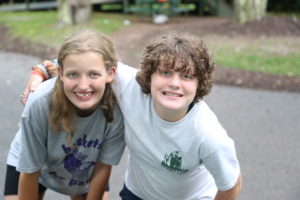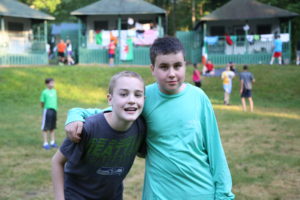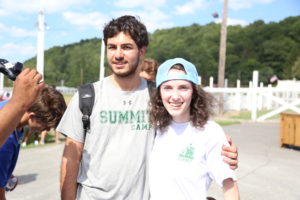 Summit Camp is in its 5th decade serving special needs boys and girls ages 8 to 23. Our campers need personal as well as interpersonal success, and Summit Camp provides it! Although our children and teens come to us with any number of diagnoses, they all share in their difficulty making and maintaining age appropriate peer relationships despite a seeming capability for such mutual relationships. Clinical diagnoses often fall into one of two categories- ADHD, verbal and non-verbal learning disabilities (NVLD), and oppositional behavioral patterns or disorders, OR, Autism diagnoses (including ‘Asperger’s’, ASD, and PDD-NOS), speech and language disorders, obsessive compulsive disorder, anxiety disorders, and sensory integration issues. Some of our youngsters may also have issues related to , tourette’s or other tic disorders, or other disorders or injuries that have resulted in neurological differences (stroke, TBI, ABI, fetal alcohol syndrome, etc.). Summit Campers and Travelers have verbal communication skills, can care for their own personal hygiene (to an age appropriate level or with reminders), and generally have some degree of social interest. On the other hand, they generally also have developed maladapative patterns of behavior to cope with social rejection and/or anxiety, may irritate or become easily frustrated with peers, and can be hyper-sensitive to the “special needs” label.
Summit Camp is in its 5th decade serving special needs boys and girls ages 8 to 23. Our campers need personal as well as interpersonal success, and Summit Camp provides it! Although our children and teens come to us with any number of diagnoses, they all share in their difficulty making and maintaining age appropriate peer relationships despite a seeming capability for such mutual relationships. Clinical diagnoses often fall into one of two categories- ADHD, verbal and non-verbal learning disabilities (NVLD), and oppositional behavioral patterns or disorders, OR, Autism diagnoses (including ‘Asperger’s’, ASD, and PDD-NOS), speech and language disorders, obsessive compulsive disorder, anxiety disorders, and sensory integration issues. Some of our youngsters may also have issues related to , tourette’s or other tic disorders, or other disorders or injuries that have resulted in neurological differences (stroke, TBI, ABI, fetal alcohol syndrome, etc.). Summit Campers and Travelers have verbal communication skills, can care for their own personal hygiene (to an age appropriate level or with reminders), and generally have some degree of social interest. On the other hand, they generally also have developed maladapative patterns of behavior to cope with social rejection and/or anxiety, may irritate or become easily frustrated with peers, and can be hyper-sensitive to the “special needs” label.
Our children may have experienced academic, emotional and social frustration attempting to achieve success within a traditional school setting. Although the child’s intellectual potential may reside at, or even above, the average, the child’s academic performance may be below expected levels or highly erratic because of inattention, challenges with executive function, impulsivity, disorganization, difficulty focusing, and/or social immaturity. The child’s experience in a traditional classroom setting may have been frustrating and even emotionally damaging.
academic performance may be below expected levels or highly erratic because of inattention, challenges with executive function, impulsivity, disorganization, difficulty focusing, and/or social immaturity. The child’s experience in a traditional classroom setting may have been frustrating and even emotionally damaging.
Our child has had difficulty in establishing meaningful and mutually rewarding relationships with other children. While often performing beautifully on a one-to-one basis with sympathetic adults, our camper often alienates, antagonizes, or isolates himself/herself from peers. Whether due to narrow interests, an inability to read social cues, language processing difficulties, hyperactivity, or a lack of awareness of the needs of others, our camper often responds awkwardly or ineffectively to the social attitudes and expectations of his or her peers. As no disability is indicated by the child’s appearance, other children (and adults) often expect and demand social behavior on a level beyond the child’s capability. Yet, if the child is identified as ‘special needs’, he/she may find this embarrassing and feel humiliated in front of peers. Likewise, neurotypical peers may be friendly towards the child- but often do not make that special connection that we think of as friendship. This leaves our campers often saying that everyone is their “friend”, yet parents and teachers are aware that these are not always relationships of equality and meaningful enjoyment. They desire the child to find someone one that can really be a friend.

The child we serve has been the recipient of love and attention within his/her home. Even within the warmth of a family setting, however, the child may have difficulty in coping with the demands placed upon them, or with the quite natural tendency of the family to be overprotective, or with siblings who cannot understand the atypical behaviors- or even the child’s seemingly ‘preferential treatment’ by the parent. This may lead to exhaustion and frustration on both sides, and parents who fear how the child will be successful in any new environment. The family is searching for a community where their child can be “who they are” without fear of rejection- or, in some cases, expulsion- by those who initially welcomed the child and offered them hope of making a connection and a positive experience outside the safety of their established settings. They wish they could magically share all their insider knowledge of how to best support and react to their child’s needs, such that other adults and perhaps even children could see the wonderful things their child has to offer.
For children and for parents, Summit is a place they come to know a child that has had such struggles can participate freely, with the knowledge that the staff and the Directorship are signing on for just such an experience. That the counselors working with the campers have come with an intent to support such needs, and that the program is developed to encourage our children to do their best while also having no qualms about supporting them when they are experiencing some of their worsts. That other children there will have similar levels of challenge- and awareness- that can mean real, meaningful friendships and interpersonal exchanges, often for the first time in the child’s life. This is why the parents think of us as the ‘Magic on the Hill’- and why the campers simply think of us as ‘Summit Camp’.